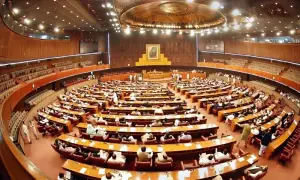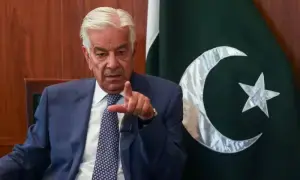Supreme Court has to interpret Article 63-A for future generations: CJP Bandial
3 min readChief Justice of Pakistan Justice Umar Ata Bandial said that the Supreme Court had to interpret Article 63-A for future generations, adding that the court was not concerned with 25 dissident lawmakers of the PTI and will fulfill its constitutional duty, Aaj News reported on Monday.
Justice Bandial made the remarks during the hearing of the presidential reference seeking the apex court’s opinion on Article 63-A of the Constitution, which is related to the disqualification of lawmakers over defection.
A five-member larger bench, headed by CJ Bandial, and comprising Justice Ijazul Ahsan, Justice Mazhar Alam Khan Miankhel, Justice Munib Akhtar and Justice Jamal Khan Mandokhail is hearing the reference.
The chief justice said that suo motu notices are not taken at the behest of anyone, and the Supreme Court took suo motu notice of the parliamentary crisis after consultations were held between 12 top court judges. The notice was taken because it was a constitutional matter, he added.
Background
Last month, following the then National Assembly Deputy Speaker Qasim Suri’s dismissal of the no-confidence motion against then Prime Minister Imran Khan, the apex court had taken suo motu notice of the matter.
The top court overturned the ruling and restored the assembly and directed the speaker to hold voting on the vote of no-confidence.
During today’s hearing, Justice Ijaz-ul-Haq said that the reference only pertained to the interpretation of Article 63-A and that decision would be binding for all the parties.
PML-N lawyer Makhdoom Ali Khan sought a delay in the hearing as he would return to Pakistan on May 15, but the bench asked him to return early as the case could not be delayed for that long.
The additional attorney general said that the new attorney general, Ashtar Ausaf, also wanted to present his argument in the case.
CJ Bandial noted that there was a reference in the election commission against the deviant members, adding that the legal questions related to the Article were valid even after the filing of references against dissident PTI lawmakers in the ECP.
Justice Bandial asked Babar Awan, the PTI counsel, why his client did not submit an application if the party was concerned at the non-implementation of the apex court’s opinion regarding Senate elections.
“The court’s decisions are not implemented by protesting in front of the election commission or somewhere else,” he added.
The judiciary intervenes when the government fails to deliver, Justice Bandial said, adding that if someone had a complaint [about courts], then they should approach the courts.
Justice Ijazul Ahsan said the judiciary could not allow political parties to malign it when verdicts are not favourable. He added the courts rule in compliance with the Constitution.
The case was adjourned till 11:30 am on Tuesday.
Presidential reference
The PTI-led government had filed the presidential reference for the interpretation of Article 63-A, asking the top court about the “legal status of the vote of party members when they are clearly involved in horse-trading and change their loyalties in exchange for money”.
In the reference, the government sought the apex court’s opinion on two interpretations of Article 63(A) and which one should be adopted and implemented to achieve the constitutional objective of curbing the menace of defections, purification of the electoral process, and democratic accountability.
For the latest news, follow us on Twitter @Aaj_Urdu. We are also on Facebook, Instagram and YouTube.





















Comments are closed on this story.